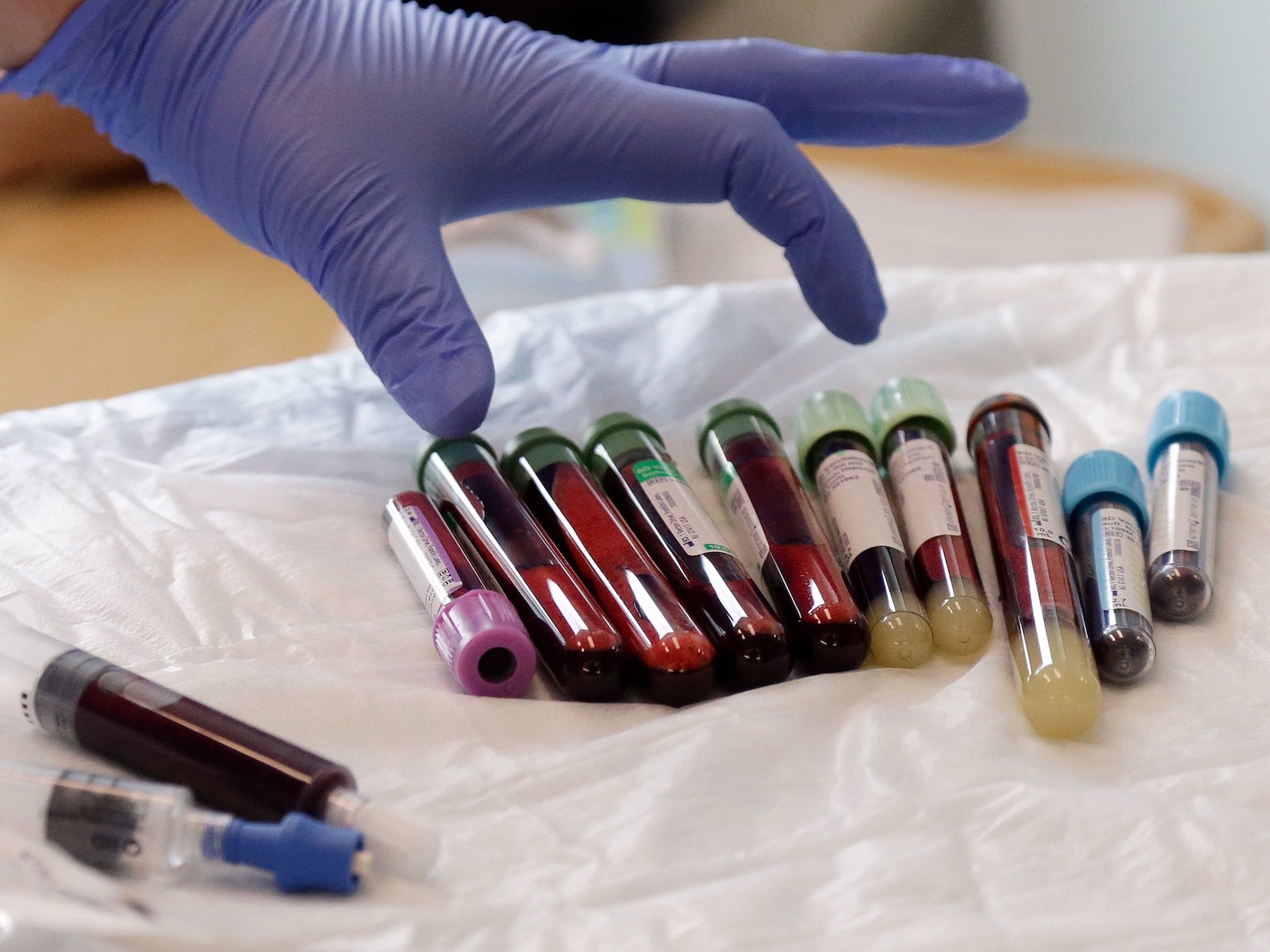 A nurse reaches for blood samples taken from a patient receiving a kind of immunotherapy known as CAR-T cell therapy at the Fred Hutchinson Cancer Research Center in Seattle. Immune therapy is the hottest trend in cancer care and its next frontier is creating “living drugs” that grow inside the body into an army that seeks and destroys tumors.AP
A nurse reaches for blood samples taken from a patient receiving a kind of immunotherapy known as CAR-T cell therapy at the Fred Hutchinson Cancer Research Center in Seattle. Immune therapy is the hottest trend in cancer care and its next frontier is creating “living drugs” that grow inside the body into an army that seeks and destroys tumors.AP- Biotech giant Celgene is in talks to acquire Juno Therapeutics, The Wall Street Journal reported on Tuesday.
- If the deal goes through, it’d be the second deal in the past few months for companies working on treatments that use the body’s immune cells to fight cancer, following Gilead’s acquisition of Kite Pharma.
- These highly personalized treatments, called CAR T-cell therapy, are at the beginning of what some are calling “a big new field of medicine.”
A new form of cancer treatment that harnesses the body’s immune cells to treat cancer is back in the headlines.
The Wall Street Journal reports that Celgene is in talks to buy cancer drugmaker Juno Therapeutics.
Juno is developing a highly personalized cancer treatment called CAR T-cell therapy (CAR is short for chimeric antigen receptor).
2017 was a big year for these treatments: the Food and Drug Administration approved two treatments, one to treat treat pediatric acute lymphoblastic leukemia in people up to age 25 and another to treat aggressive B-cell non-Hodgkin lymphoma. And in August, Gilead Sciences nabbed CAR-T drugmaker Kite Pharma in a $12 billion deal.
The interest in Juno has drummed up excitement for a possible deal for Bluebird Bio, another company developing cell therapies that has partnerships with Celgene. Bluebird was up as much as 7% on Tuesday evening following the Celgene-Juno report.
How CAR-T cell therapy works
These treatments aren’t your run-of-the-mill pill — or even a biologic drug, like insulin — that can be mass produced. Since the therapy is made from a person’s own immune system, the process can take about three weeks.
- To start, a doctor removes some white blood cells, the part of our body’s immune system responsible for combatting infections and foreign substances, from a patient. In a healthy body, the immune system can recognize abnormal, cancerous cells, but for people with cancer, it doesn’t recognize that the cells are spreading.
- Then the cells are taken to a manufacturing facility at which point the cells are reengineered to recognize cancer cells and wipe them out.
- Those reprogrammed cells are sent back and administered to the patient.
 Ana Pelisson/Business Insider; Novartis
Ana Pelisson/Business Insider; Novartis
While the treatments don’t work in all patients, it can have dramatic results in those who do respond. For example, in a trial of 63 patients treated with Kymriah — the first cell therapy approved — 83% were in remission after three months, and 64% were still in remission after a year.
‘A big new field of medicine’
With two CAR-Ts already approved and more in the works over the next few years, the field of cell therapies is starting to emerge.
“We’re at the very beginning of what’s going to be a big new field of medicine,” David Epstein, who helped license Kymriah from the University of Pennsylvania while at Novartis, told Business Insider in August after Kymriah was approved.
Epstein left Novartis in 2016 as CEO of its pharmaceuticals divisions. He’s now the executive chairman of Rubius Therapeutics, a biotech firm that’s also working with cell therapy to develop treatments like the CAR-Ts that don’t have to be as personalized. The hope is that one day doctors will be able to prescribe a cell therapy and use it that same day instead of waiting weeks to get it back.
Epstein said he envisioned cell therapies having much shorter life cycles than traditional drugs. Instead of getting a better, updated therapy for a disease every decade or so, we might begin to see second-generation cell therapies in a few years.
One challenge these therapies still face is how toxic they can be. CAR-T’s side effects can be deadly. In May 2017, Kite disclosed thatone person had diedin a clinical trial for its late-stage CAR-T therapy from cerebral edema, a condition in which excessive fluid causes the brain to swell. Juno said five people in itsclinical trials had died, all from cerebral edema.
Eventually, cell therapies could go beyond blood cancers, and include solid tumors and maybe even autoimmune diseases like Type 1 diabetes, Epstein said.













